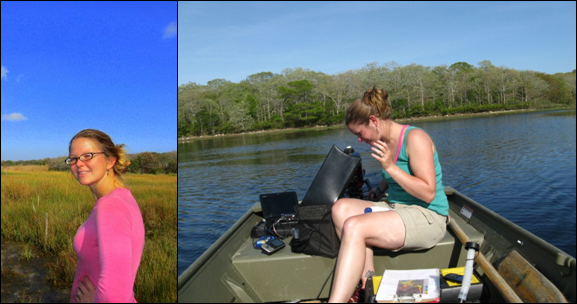Bachelor of Science – 2008

What do you do for a living?
Upon graduating, I joined the Save the Bay organization located in Rhode Island and supported them as an eelgrass research assistant. My daily work consisted of SCUBA diving to harvest and transplant eelgrass, as well as conducting research associated with test bed locations. After taking the GRE, I matriculated into the UMASS graduate program in the Fall of 2009. I am currently working towards a Masters Degree in Coastal Systems Science, conducting research on the abundance and distribution of drift macroalgae in southeastern Massachusetts estuaries and the potential drivers of macroalgal presence/absence in estuarine systems. My research requires the use of underwater video techniques to conduct surveys of selected estuaries in southeastern Massachusetts to quantify areal and temporal distribution patterns of macroalgal accumulations. In addition, I am conducting growth experiments to investigate the linkage between environmental variables and observed accumulations.
What’s the most interesting thing you’ve done/learned in your marine sciences career?
One of the more stimulating aspects of my research assistantship with the Coastal Systems program has been the range of projects I have been able to work on as well as the vast quantity of environmental data the lab has collected over the past decade. All the data sets have been collected in the context of the Massachusetts Estuaries Project (the second largest estuarine restoration program behind the Chesapeake Bay Program) utilizing a consistent methodology thereby enabling inter-estuarine comparisons of habitat impairment and its drivers. Over the past few years I have had the opportunity to learn about and participate in a wide range of applied science. Activities have ranged from lab/field work associated with the Massachusetts Estuaries Project to underwater survey work using SCUBA and autonomous underwater vehicles to complete surveys of fresh water mussels in Ashumet Pond on Cape Cod. I have even assisted the lab in oceanographic surveying of the hydrokinetic characteristics of Muskeget Channel (between Martha’s Vineyard and Nantucket) for future marine renewable energy development using the power of tides. Being involved in multi-disciplinary projects with real world applications has allowed me to keep thinking about the environment from different perspectives, while maintaining the ability to work on my thesis and utilize past data in new ways. I plan to graduate with a Masters of Science degree in Coastal Systems Science in the winter of 2012.
What aspect(s) of the UConn Marine Sciences Program uniquely prepared you for your success?
Conducting research as an undergraduate and developing an honors research thesis, provided me with the self discipline required to conduct graduate level research. As an undergraduate I was given the opportunity to participate in research cruises, conduct lab experiments and co-author a paper which was published in The Journal of Shellfish Research. Without these experiences and the dedication of the professors at Avery Point, I would not be where I am today.
For a closer look at Kaitlyn’s graduate lab …….